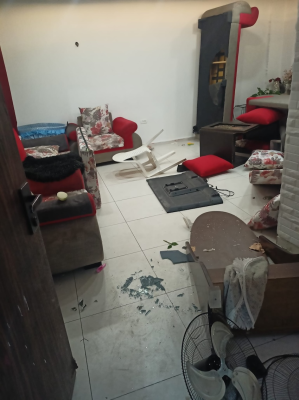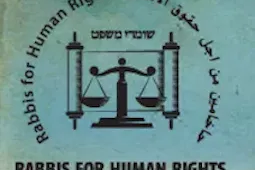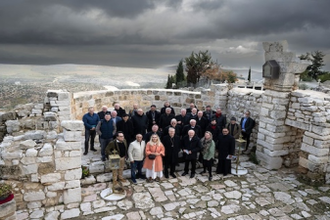Letter from the Holy Land - 4

Living room vandalised by IDF
Melanie Nazareth has recently returned from Israel and occupied Palestine where she spent two and a half months with the Ecumenical Accompaniment Programme in Palestine and Israel.
On my final day in the West Bank, we were sitting in a home in one of the refugee camps. The camps were originally set up to house people displaced from their villages by the violence that displaced 750,000 Palestinians when the state of Israel was established in 1948, and which absorbed many of the 300,000 displaced when Israel occupied the West Bank and other Palestinian territory following the Six-Day War in 1967. In the years since then, with the Israeli government denying Palestinians the right to return to their homes and villages, the temporary structures have become densely packed permanent buildings. *Marwan's family originally fled from a village in the Hebron area and have experienced much upheaval. He is desperate not to get involved in the escalating tensions in the camp. "I just want a safe life with my family," he said a number times in our conversation. He has his wife, three children and mother living in the two storey dwelling, where he has so clearly put a great deal of time and effort into making a family home.
He prepared Arabic coffee in the little kitchen that opens off the living space while we continued talking. We were talking about their access to water. He explained that the water comes at intervals through pipes from which they fill the tank on the roof (the water tanks on the roofs are one of the ways you can tell a Palestinian community), but the pipes are sometimes shut off for extended periods as a result of Israeli restrictions on the amount of water supplied to the Palestinian Water Authority So then they have to buy water from a tanker that drives into the camp and this is very expensive. It's hard, he said, because he never knows when the water will come through the pipes and he may have just paid to fill from the tanker and maybe this will happen the next time too. There is no room for an electric pump so the water from the tanker has to be pumped up to the roof by hand. And anyway, the electricity is also often cut off especially in the winter but that is life here, he reflected.
The children joined us, his eight year old daughter carrying the one year old and trailed by her six year old brother, still sleepy in their pyjamas. There were Israeli soldiers in the camp at about four that morning and although they didn't come to his house, Marwan said he wakes the children up if the soldiers are nearby because sometimes they knock on his door and sometimes they break the door down if he is too slow answering. Yes, he said, there are often night raids; no, the children are not alright, they cry and they are scared. "If soldiers come at night, I don't care any more, because I am used to it." said his daughter fiercely.
As we were leaving I asked Marwan if there was anything else he wanted to say. He thought and then responded "I have a family, children. We want to live. I just want them to leave us alone. We can all live together."
Ten days after this conversation with Marwan and his children, a message came up on my phone screen. Soldiers had come to the camp and Marwan's home was one of those they searched. The photos of the room we had been sitting in, now turned upside down were shocking. The broken glass, the upended sofa, the television face down on the floor. There were photos of the damage in other rooms too. I read that Marwan had been hurt on the head in incident. Fortunately he did not require hospital attention, but I wonder how his children felt seeing their father injured. I wondered too how they coped with armed soldiers, with the noise, with the chaos. Isn't home supposed to be a safe place?
Marwan's is only one of many, many similar stories we heard about raids on family homes. They have a profound effect on everyone in the household, but children are amongst the most vulnerable to the trauma. In another conversation, a young woman, now a university student, told us "Most of us have internal trauma inbuilt. Most of us have PTSD and panic attacks, but we have got so used to it that we have normalised it. We were born under this situation."
The Israeli authorities argue that conducting these raids and searches is part of their responsibility to maintain public order and safety. See: https://life-exposed.com/wp-content/uploads/2020/11/Exposed_Life_EN_FINAL.pdf .
Israeli Defence Forces have said that "the main purpose of the security forces' entry into those houses is for security and operational purposes, and is intended to thwart the carrying out of terrorist activity against Israeli targets." See: www.theguardian.com/world/2020/nov/29/dehumanising-israeli-groups-verdict-on-military-invasions-of-palestinian-homes
However research by Israeli human rights organisations has concluded that these are arbitrary and harmful invasions of homes, which take place in the absence of concrete military necessity and "not because of some specific suspicion against them, but in an attempt to influence their future conduct or the conduct of the entire community". See: https://life-exposed.com/wp-content/uploads/2020/11/Exposed_Life_EN_FINAL.pdf
The accounts we heard from families of the way in which these searches were carried out, described violations of a number of provisions of international law, including Article 27 of the Fourth Geneva Convention which entitles Palestinians to respect for their persons, their honour, their family rights, and to be at all times be humanely treated, and protected against acts and threats of violence; and Article 53 of that Convention which prohibits destruction by an occupying power of personal property, except where absolutely necessary for military operations.
Marwan's children have rights too. Article 16 of the 1990 Convention on the Rights of the Child, recognising that children are entitled to a degree of special care, says that no child shall be subjected to arbitrary interference with their privacy, family, or home.
*Not his real name for his own safety.


















